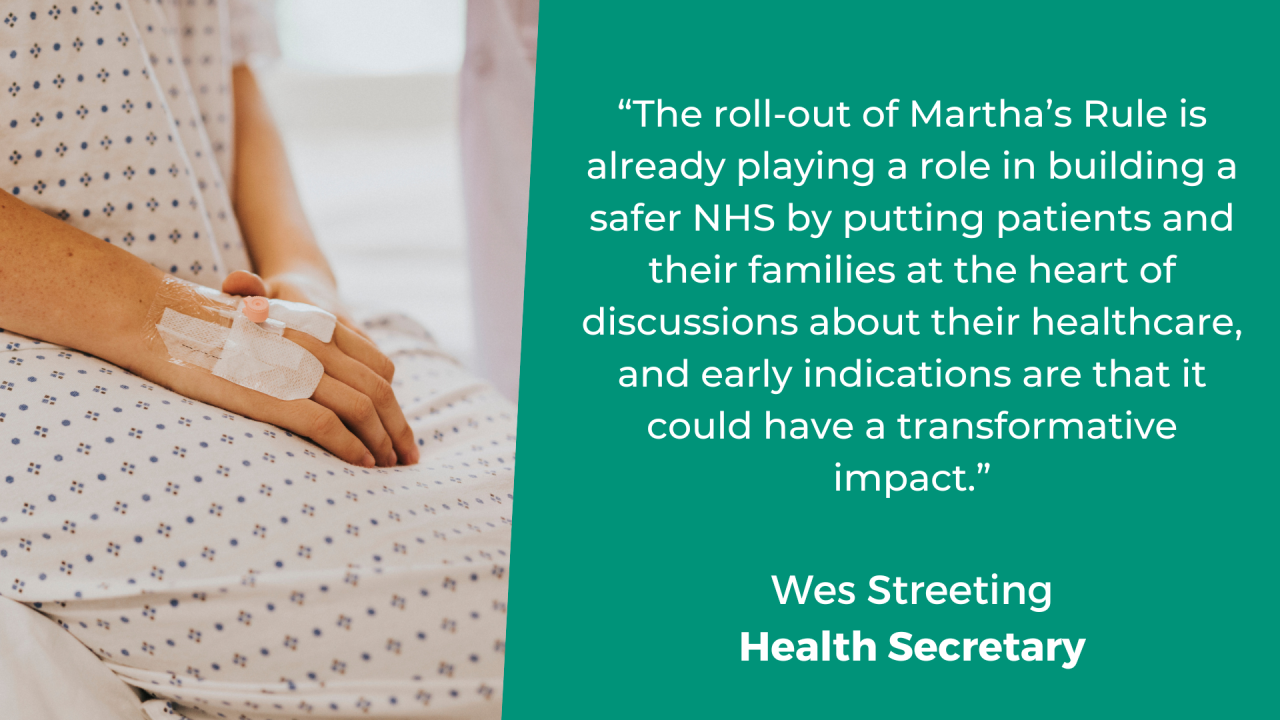The roll-out of Martha’s Rule in NHS hospitals across England is already bringing about “potentially life-saving changes in care” for patients, according to the NHS.
This significant patient safety initiative aims to provide a consistent and understandable way for patients and families to seek an urgent review if they are concerned about a deterioration in their or their loved one’s condition.
Martha’s Rule is named after Martha Mills, who tragically died from sepsis at the age of 13 in 2021. Her death was attributed to a failure to escalate her to intensive care and a lack of response to her family’s concerns about her deteriorating condition. Her parents, Merope Mills and Paul Laity, have been instrumental in advocating for this change.
Health Secretary Wes Streeting commented:
“I thank Merope Mills and Paul Laity for their tireless campaign for Martha’s Rule: it is just a shame that it took such a heartbreaking tragedy, and the bravery of Martha’s parents to speak out, for this change to be made.
“The roll-out of Martha’s Rule is already playing a role in building a safer NHS by putting patients and their families at the heart of discussions about their healthcare, and early indications are that it could have a transformative impact. This government is committed to making sure every patient is heard”.

Early data from participating hospital sites across England shows that in September and October alone, there were at least 573 calls made to escalate concerns about a patient’s condition deteriorating. These calls came from patients, their families, carers, and NHS staff. Of these, around half (286) required a clinical review for acute deterioration, with approximately 1 in 5 (57) of these reviews leading to a change in the patient’s care. These changes included potentially life-saving treatments such as antibiotics, oxygen, or other interventions, while the patients remained on their current wards.
In the first two months, 14 calls made via the new Martha’s Rule initiative resulted in a patient needing urgent transfer to an intensive care unit. Additionally, other patients were moved to high dependency units, coronary care units, and other critical environments for necessary interventions.
Of the 573 calls, 86 (15%) were from patients, 436 (76%) were from family, carers, or designated advocates, and 51 (9%) were from NHS staff. The NHS announced in May 2024 that 143 hospital sites would test and roll out Martha’s Rule in its first year as part of this major patient safety initiative.
Martha’s Rule consists of three key components to ensure concerns about deterioration are swiftly addressed:
- 24/7 Escalation Process: Available at all 143 sites, advertised throughout hospitals, enabling patients and families to contact a critical care outreach team.
- Staff Access: NHS staff can also use this process if they have concerns about a patient’s condition.
- Daily Insights: Clinicians will record daily insights from families about a patient’s health, ensuring any concerning changes are considered.
The initial target was to enrol at least 100 sites, but due to significant interest, the programme was expanded to 143 locations by March 2025. Evaluation of the system’s effectiveness will inform proposals for further expansion across all acute hospitals, subject to future government funding.
The introduction of Martha’s Rule is a transformative step in improving patient safety within the NHS. With early data showing significant positive impacts, this initiative is poised to make a lasting difference in how patient care is managed, ensuring that the voices of patients and their families are heard and acted upon.
Image credit: iStock



















